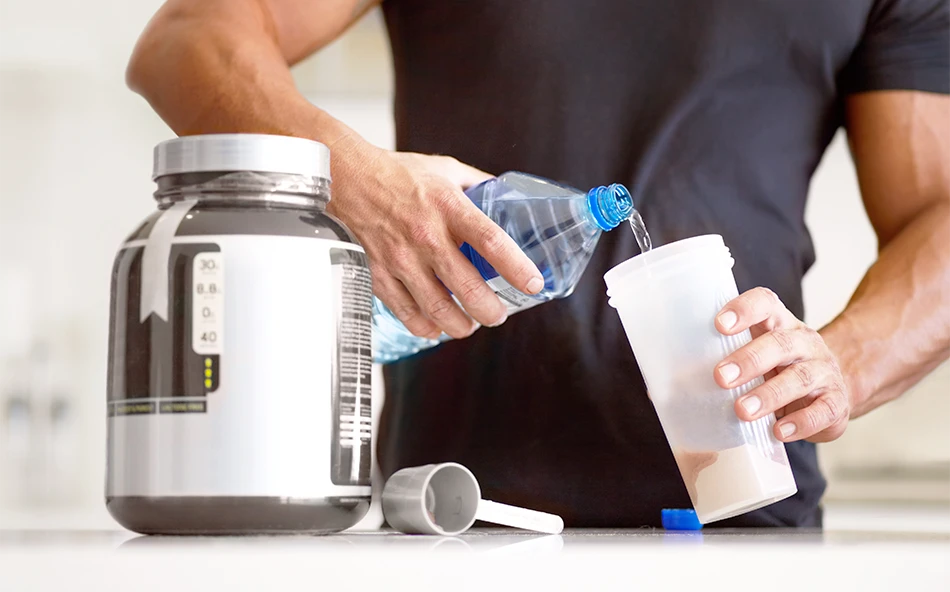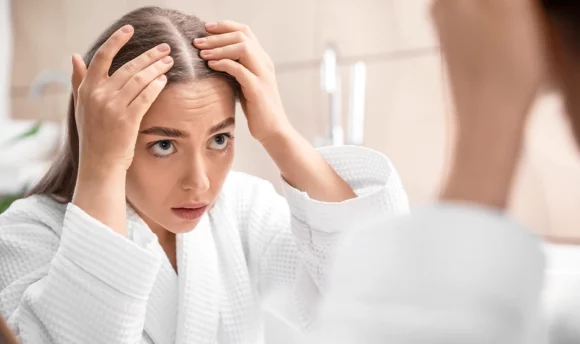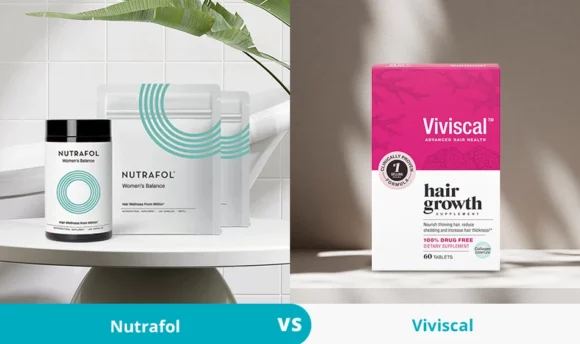Does Creatine Cause Hair Loss? Replacing Myths With Facts
Creatine is one of the best supplements for enhancing athletic performance. Despite its benefits, which have been supported by science, some people steer clear of creatine out of concerns that it may cause hair loss. Discover if this is the truth.

Each year, billions are spent on treating and avoiding hair loss, which can be an upsetting and stressful experience for both men and women.
Age, genetic predisposition, and lifestyle choices are just a few factors that can cause hair loss. But can creatine, a popular fitness supplement, lead to this result?
Let’s examine how creatine supplements may be related to hair loss and what you can do to prevent hair loss from creatine.
Does Creatine Cause Hair Loss? All You Need to Know
There isn’t enough data to say whether hair loss is one of creatine’s side effects. Much of the proof is anecdotal based on individual accounts or experiences.
The only scientific evidence suggesting a link between creatine monohydrate and hair loss was a 2009 study in the Clinical Journal of Sports Medicine. The research followed 20 male rugby players for 3 weeks who were on a creatine supplement regimen.
The study calculated the ratio of dihydrotestosterone (DHT) to testosterone in the men. In the first days, the levels of DHT rose to over 50%, and for the next two weeks, the levels reached over 40%.
DHT, a powerful androgen, is thought to be the hormone that causes male-pattern baldness by interacting with hair follicles in people genetically predisposed to hair loss. Other than this increase, there was no evidence of hair loss or that the test subjects had male-pattern baldness.
What Is Creatine?
Creatine is a natural substance in the body, mainly in the muscles and brain. It consists of 3 amino acids: glycine, arginine, and methionine. During high-intensity activities, the body produces energy with the help of creatine.
Most of the creatine in your body is made in the liver, pancreas, and kidneys. Creatine is also a naturally occurring organic compound that comes from the food you eat, especially red meat and seafood.
Creatine supplementation can help athletes and bodybuilders gain muscle mass and perform better during workouts. Taking these supplements can increase the amount of creatine in the muscles, contributing to enhanced energy during exercise and consequently improving strength, power, and endurance.
Creatine supplements are available in various forms, including powders, tablets, and liquids.
Benefits of Creatine
Being one of the most researched supplements on the market, creatine has numerous studies showing its potential health benefits. Learn how helpful it can be:
- Increased muscle mass: Creatine supplementation can stimulate important biological processes such as the creation of proteins that develop new muscle fibers, increased cell volume, and levels of insulin-like growth factor 1 that lead to increased muscle growth and size.
- Improved exercise performance: Creatine supplements increase your muscles’ phosphocreatine reserves. Phosphocreatine helps form adenosine triphosphate (ATP), an essential molecule that your cell uses for energy and all basic life processes. ATP is broken down during exercise to release energy. This can significantly improve performance and endurance during high-intensity exercise.
- Improved brain function: According to research, your brain needs a substantial amount of ATP to perform challenging tasks. To help your brain generate more ATP, supplements can increase the amount of your phosphocreatine stores. Creatine may also improve brain function by boosting dopamine levels and mitochondrial efficiency. This means boosted intellect, memory, and other cognitive benefits.
- Protection against neurological diseases: Phosphocreatine depletion in the brain is one of the main causes of neurological defects. Research with controlled mice found that phosphocreatine increased from 26% to 72% when creatine was used. This might prevent the development of neurological conditions like Alzheimer’s disease and ischemic stroke.
- Supports healthy blood sugar levels: Creatine helps reduce blood sugar levels by improving the activity of the GLUT-4 molecule, which aids in delivering blood glucose to the muscles. The faster your body can eliminate glucose from your bloodstream, the healthier your blood sugar levels can be.
Side Effects of Creatine
While creatine is generally considered safe, there are some potential side effects you should be aware of:
- Kidney damage: Although this is typically only a concern for people with pre-existing kidney issues, there is some concern that high doses of creatine may cause kidney damage.
- Weight gain: Creatine can cause a rapid increase in body weight due to increased water retention in the muscles. This weight gain, however, can also be because of increased muscle mass and not increased body fat.
- Digestive issues: Excessive doses of creatine may cause digestive issues. Some people may experience nausea, diarrhea, or abdominal pain. According to research, a 10-gram dose, given once daily, was shown to raise diarrhea by 56% compared to a placebo.
- Interference with medications: Creatine may interfere with certain medications, such as diuretics, which can cause dehydration. Taking creatine with any drug that affects the kidney is also not recommended.
How Does Creatine Relate to Hair Loss?
Creatine supplementation can increase a hormone called dihydrotestosterone (DHT) in the body, which increases the enzyme that converts testosterone to DHT. This can cause hair loss.
The creatine group in the above study received a loading dose of 25g/day for one week, followed by a maintenance dose of 5g/day for two weeks, which significantly increased dihydrotestosterone levels by 0.12ng/mL (12ng/dL).
DHT is known to cause male pattern hair loss by shrinking hair follicles and shortening the hair growth phase. This increase in DHT levels caused by creatine supplementation may accelerate hair loss, especially if you’re genetically predisposed to baldness.
More research is needed to determine whether taking creatine pills can cause hair loss.
Creatine and DHT levels
Everyone naturally has some amount of DHT in their bodies because it is a natural byproduct of testosterone production. However, higher levels of DHT can cause hair loss, but only if you already have a genetic predisposition to it.
Taking creatine supplements can increase DHT levels in the body, which would increase 5 alpha-reductase enzymes, an enzyme that converts testosterone to DHT.
The hair growth cycle can be shortened, and hair can become thinner when DHT binds to the hormone receptors on the hair follicles. Hair falls out earlier due to a shorter hair growth cycle, resulting in hair loss.
How to Prevent Hair Loss From Creatine
If you believe creatine supplementation is causing hair loss, the simplest thing to do is to stop taking creatine. You can easily determine what type of baldness you have if you stop taking creatine for 2–3 months, which is enough time for hair to grow back.
If you notice a regrowth, you may have creatine-induced hair loss. Try substituting the creatine supplement with a different protein, such as whey protein.
You can also use hair loss medications to treat creatine-induced hair loss. Medications such as finasteride and minoxidil may work for you if your hair loss is related to high levels of DHT. They work by preventing the conversion of testosterone to DHT.
If you’re looking for more permanent solutions, laser treatments and hair transplants are other possible options for stopping hair loss or growing healthy hair.
Always talk to a dermatologist before taking any medication, as everyone reacts differently.
FAQs
While there is not enough research to directly link creatine to hair loss, creatine can only accelerate hair loss if you are genetically predisposed to it.
If the hair loss you’re experiencing is caused by creatine, it’s likely that you’ll start losing hair two months after you start taking the recommended dosage of this supplement.
Hair loss from creatine is not permanent. Your hair will grow back once you stop taking it. However, if creatine accelerates your genetic condition, your hair may not regrow without regrowth therapy.
A Word From a Trichologist
Creatine supplementation does not directly cause hair loss. However, if your hair loss is sudden, severe, or persistent, you should see your doctor.
You should also consult your doctor if you lose a lot of hair when you brush or wash your hair.
It’s also important to talk to your doctor before taking any over-the-counter medications, especially if you have a medical condition, are taking other medications, or are an elderly person.
Women who are losing their hair should also see a doctor as soon as possible. Hair loss in women may indicate a serious medical condition such as PCOS or hyperthyroidism.
Conclusion
While creatine supplementation may indirectly cause hair loss, there is also enough research to support the assertion that taking creatine supplements can have a wide range of additional health benefits.
Suppose you want to continue taking this well-known fitness supplement but are concerned about the possible side effects of creatine causing hair loss. In this case, some medications, such as minoxidil and finasteride, can prevent an increase in DHT levels that may be associated with hair loss in some genetically predisposed individuals.

















































 Select your language:
Select your language: 








